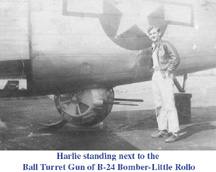WWII Gunners took real "Flack"

|
|
H.
G. Turner WWII Gunners took real "Flack" |
|
Their average age was 20. They came from cities, small towns and rural communities across the country. More than 26,000 were killed in action.
Oct. 8-14 has been declared Mighty Eighth Air Force Week to remember the week in 1943 when the largest bomber force in U.S. military history lost more than 100 heavy bombers over the skies of Europe in World War II. About 400 veterans who flew bombers or fighters belong to the Iowa Chapter of the Eighth Air Force Historical Society.
Two Dubuque men who survived their service in the Eighth Air Force can vividly recall their experiences more than five decades later.
 |
Harlyn Turner, 75, was only 18 when he enlisted in the military in Dubuque in 1942.
Bill Link, 78, was all of 22 when he did the same in 1943. Photos of each from 55 years ago, show handsome young men in crisp uniforms posing in front of bombers.
Both young mem ended up on bombing missions over occupied Europe. Turner was an assistant radio operator and ball turret gunner on B-24 bombers. Link was the flight engineer and top turret gunner on B-17s. The two admit there was friendly rivalry between crews of both types of bombers, each touting their aircraft as better.
|
Turner flew 31 bombing missions from March through July 1944. Link's 10 man crew flew 27 missions between December 1944, and the end of the war. Both vividly remember the scene over the skies of Europe.
"The flack was the worst. It was the shells from the anti-aircraft guns on the ground which exploded at plane level. You could feel every concussion," Turner said.
"I remember one mission over Mannheim, Germany. The air was black with flack and we couldn't drop the bombs the first time around for some reason, so we had to circle back into it. It wasn't pleasant," Link said.
Emotions ran high inside the planes, but Turner said, "You couldn't show your fright no matter what you felt inside." Most of the time, the crew was so intensely focused on their task that they had no time to be frightened or worried about their fate.
That is the main difference the two veterans notice between the reality they lived in air battles and the scenes depicted in Hollywood's versions of the air war.
"Movies try to sensationalize it and don't care if it is accurate. There was no chitchat between the crew - it was all business," Link said. The men agreed that the worst portrayal of air combat was in "Memphis Belle" and that "Twelve O'Clock High" was the most accurate.
Turner recalled his four most-memorable missions: his first one, because of his high level of excitement; D-Day, when his group led the Eighth Air Force over Normandy; and another when scores of German fighters attacked the Eighth over Brunswick, Germany, and "a lot" of U.S. planes were lost.
The mission that meant the most to Turner however, was on July 12, 1944. It was his last and his plane was hit, knocking out an engine. The choice was made to limp back to England rather than try to land in neutral Switzerland. While doing so, the crew watched a nearby plane, also damaged by enemy fire, as it was attacked and felled by German fighter planes. There were sure they were next.
Turner's plane made it, however, and as he celebrated his final flight, he received news from home that he was the father of a healthy baby girl. The same day, he received the distinquished flying cross, one of five air medals and four major battle medals he was awared for his service.
Link remembered what he was doing when he heard the war in Europe was over. "We had run out of targets to bomb and were taking some of the ground crews up to look at the bomb damage. I was on the radio and the announcement came over. There was such a sense of relief among the crew," he said.
Both mem support increased spending for the military and salary increases for military personnel. They were paid $50 per month for their service.
"It's cut, cut, cut, and they're closing more and more military bases. We should be more prepared than we are. We've still got many threats from the outside," Turner said.
Link added that the draft would have to be reinstituted if the military needed to beef up its numbers, because young people are not joining its ranks as they did in the past.
More than 350,000 members of the Eighth Air Force served in the war in Europe. Besides 26,000 killed, at least 20,000 were taken prisoners of war. It continues as an operational combat unit. More than a million mem and women have served in the Eighth Air Force over the years, both in war and in peace.
|
|
|||
 Home |
 Top |
 |
|